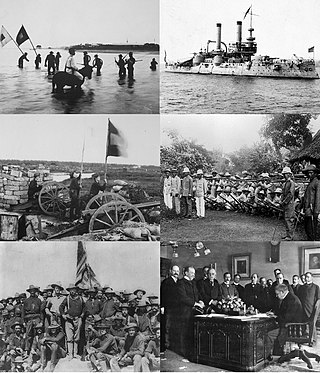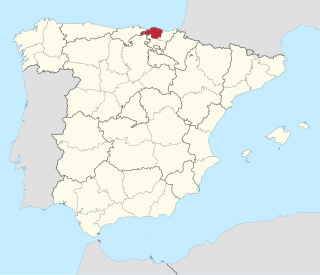
Colombia, officially the Republic of Colombia, is a country mostly in South America with insular regions in North America. The Colombian mainland is bordered by the Caribbean Sea to the north, Venezuela to the east and northeast, Brazil to the southeast, Ecuador and Peru to the south and southwest, the Pacific Ocean to the west, and Panama to the northwest. Colombia is divided into 32 departments. The Capital District of Bogotá is also the country's largest city hosting the main financial and cultural hub, and other major urbes include Medellín, Cali, Barranquilla, Cartagena, Santa Marta, Cúcuta, Ibagué, Villavicencio and Bucaramanga. It covers an area of 1,141,748 square kilometers, and has a population of around 52 million. Colombia is the largest Spanish-speaking country in South America. Its cultural heritage—including language, religion, cuisine, and art—reflects its history as a colony, fusing cultural elements brought by immigration from Europe and the Middle East, with those brought by the African diaspora, as well as with those of the various Indigenous civilizations that predate colonization. Spanish is the Official language, although English and 64 other languages are recognized regionally.

Francisco Franco Bahamonde was a Spanish military general who led the Nationalist forces in overthrowing the Second Spanish Republic during the Spanish Civil War and thereafter ruled over Spain from 1939 to 1975 as a dictator, assuming the title Caudillo. This period in Spanish history, from the Nationalist victory to Franco's death, is commonly known as Francoist Spain or as the Francoist dictatorship.

Puerto Rico, officially the Commonwealth of Puerto Rico, is a Caribbean island and unincorporated territory of the United States with official Commonwealth status. It is located in the northeast Caribbean Sea, approximately 1,000 miles (1,600 km) southeast of Miami, Florida, between the Dominican Republic and the U.S. Virgin Islands, and includes the eponymous main island and several smaller islands, such as Mona, Culebra, and Vieques. It has roughly 3.2 million residents, and its capital and most populous city is San Juan. Spanish and English are the official languages of the executive branch of government, though Spanish predominates.

Real Madrid Club de Fútbol (Spanish pronunciation: [reˈal maˈðɾið ˈkluβ ðe ˈfuðβol], commonly known as Real Madrid, is a Spanish professional football club based in Madrid. Founded in 1902, the club has a storied history and has been a constant presence in La Liga, the top tier of Spanish football, since the league's establishment in 1929. With an impressive record of domestic and international achievements, Real Madrid is widely regarded as one of the most successful and influential football clubs globally.

Spain, or the Kingdom of Spain, is a country primarily located in Southwestern Europe, with parts of territory in the Atlantic Ocean and across the Mediterranean Sea. The largest part of Spain is situated on the Iberian Peninsula; its territory also includes the Canary Islands in the Atlantic Ocean, the Balearic Islands in the Mediterranean Sea, and the autonomous cities of Ceuta and Melilla in Africa. The country's mainland is bordered to the north by France, Andorra and the Bay of Biscay; to the east and south by the Mediterranean Sea and Gibraltar; and to the west by Portugal and the Atlantic Ocean. It is the largest country in Southern Europe and the second-largest and fourth-most populous in the European Union. Spain's capital and largest city is Madrid; other major urban areas include Barcelona, Valencia, Zaragoza, Seville, Málaga, Murcia, Palma de Mallorca, Las Palmas de Gran Canaria, and Bilbao.

Spanish, or Castilian, is a Romance language of the Indo-European language family that evolved from colloquial Latin spoken on the Iberian Peninsula of Europe. Today, it is a global language with about 486 million native speakers, mainly in the Americas and Spain. Spanish is the official language of 20 countries. It is the world's second-most spoken native language after Mandarin Chinese; the world's fourth-most spoken language overall after English, Mandarin Chinese, and Hindustani (Hindi-Urdu); and the world's most widely spoken Romance language. The largest population of native speakers is in Mexico.

The Spanish–American War began in the aftermath of the internal explosion of USS Maine in Havana Harbor in Cuba, leading to United States intervention in the Cuban War of Independence. The war led to the United States emerging predominant in the Caribbean region, and resulted in U.S. acquisition of Spain's Pacific possessions. It led to United States involvement in the Philippine Revolution and later to the Philippine–American War.

The Campeonato Nacional de Liga de Primera División, commonly known simply as Primera División in Spain, and as La Liga in English-speaking countries and officially as LaLiga Santander for sponsorship reasons, is the men's top professional football division of the Spanish football league system. Administered by the Liga Nacional de Fútbol Profesional, it is contested by 20 teams, with the three lowest-placed teams at the end of each season being relegated to the Segunda División and replaced by the top two teams and a play-off winner in that division.

Futbol Club Barcelona, commonly referred to as Barcelona and colloquially known as Barça, is a professional football club based in Barcelona, Catalonia, Spain, that competes in La Liga, the top flight of Spanish football.

Biscay is a province of Spain and a historical territory of the Basque Country, heir of the ancient Lordship of Biscay, lying on the south shore of the eponymous bay. The capital and largest city is Bilbao.

The Spain national football team has represented Spain in international men's football competitions since 1920. It is governed by the Royal Spanish Football Federation, the governing body for football in Spain.

Akelarre is the Basque term meaning Witches' Sabbath. Akerra means male goat in the Basque language. Witches' sabbaths were envisioned as presided over by a goat.

Amurrio is a town and municipality located in the northwest part of the province of Álava, in the Basque Country, northern Spain. It has over 10,000 inhabitants. It is between Vitoria-Gasteiz and Bilbao, respectively to 41 km and 31 km.

Artziniega (Artzainaga) is a town and municipality in the province of Álava, in the Basque Country, northern Spain. Located in the northwest of Araba, on the border with Burgos, Castile and León and Biscay, it was at the junction between the old Kingdom of Castile and the ports of the Bay of Biscay.

Mexico, officially the United Mexican States, is a country in the southern portion of North America. It is bordered to the north by the United States; to the south and west by the Pacific Ocean; to the southeast by Guatemala, Belize, and the Caribbean Sea; and to the east by the Gulf of Mexico. Mexico covers 1,972,550 km2, making it the world's 13th-largest country by area; with a population of over 126 million, it is the 10th-most-populous country and has the most Spanish speakers. Mexico is organized as a federal republic comprising 31 states and Mexico City, its capital. Other major urban areas include Monterrey, Guadalajara, Puebla, Toluca, Tijuana, Ciudad Juárez, and León.

Telemundo is an American Spanish-language terrestrial television network owned by NBCUniversal Telemundo Enterprises, a division of NBCUniversal, which in turn is a wholly owned subsidiary of Comcast. It provides content nationally with programming syndicated worldwide to more than 100 countries in over 35 languages.

The Spanish Civil War was a civil war in Spain fought from 1936 to 1939 between the Republicans and the Nationalists. Republicans were loyal to the left-leaning Popular Front government of the Second Spanish Republic, and consisted of various socialist, communist, separatist, anarchist, and republican parties, some of which had opposed the government in the pre-war period. The opposing Nationalists were an alliance of Falangists, monarchists, conservatives, and traditionalists led by a military junta among whom General Francisco Franco quickly achieved a preponderant role. Due to the international political climate at the time, the war had many facets and was variously viewed as class struggle, a religious struggle, a struggle between dictatorship and republican democracy, between revolution and counterrevolution, and between fascism and communism. According to Claude Bowers, U.S. ambassador to Spain during the war, it was the "dress rehearsal" for World War II. The Nationalists won the war, which ended in early 1939, and ruled Spain until Franco's death in November 1975.
Xabier Pikaza Ibarrondo is a Spanish theologian of Liberation Theology and professor at Pontifical University of Salamanca. He is one of the most renowned Spanish theologians of his time.
Iñigo Orozco Andonegui, sometimes referred to as Iñigo Orozko, is a Spanish footballer who plays as a forward for SD Amorebieta.






















